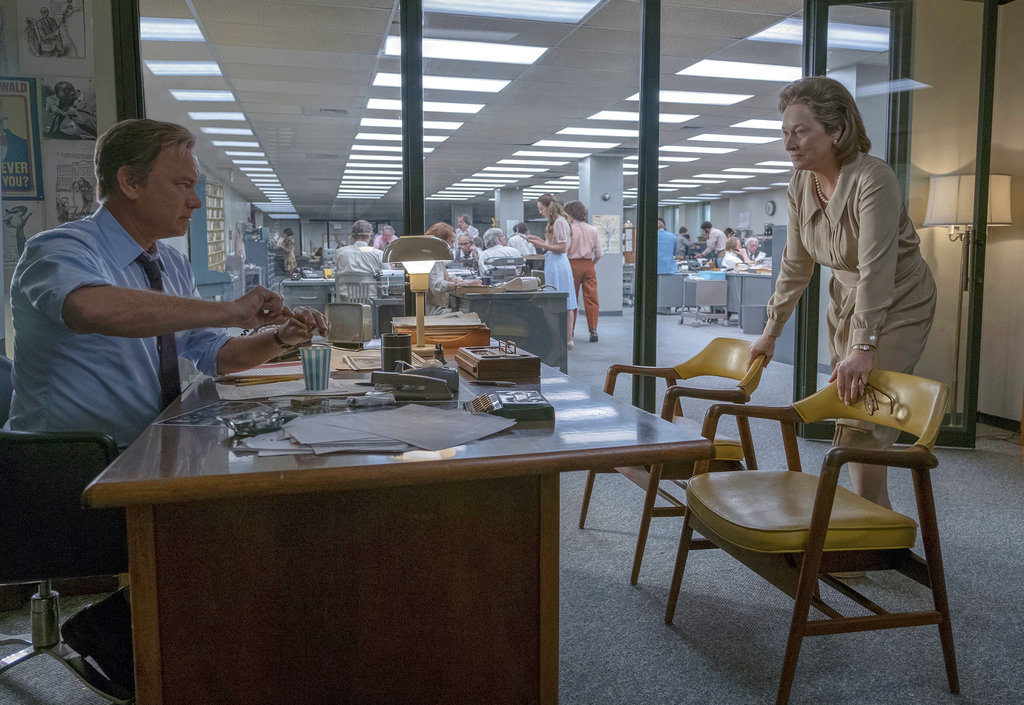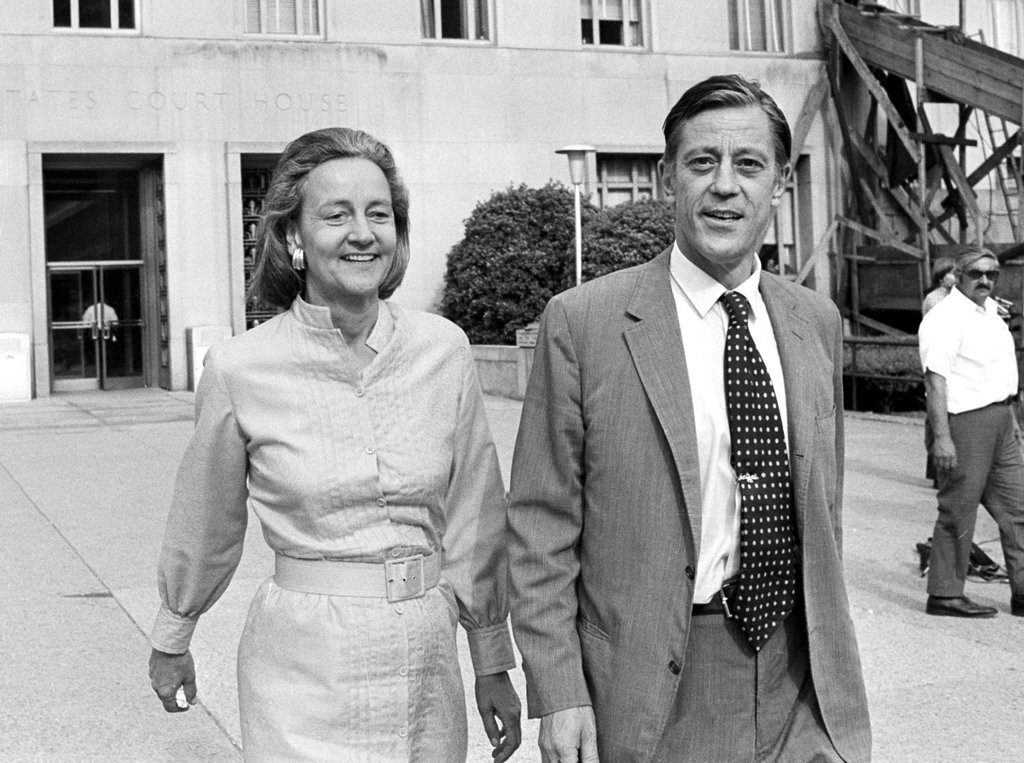
In this image released by 20th Century Fox, Tom Hanks portrays Ben Bradlee, left, and Meryl Streep portrays Katharine Graham in a scene from “The Post.” The film is nominated for an Oscar for best picture. The 90th Oscars will air live on ABC on Sunday, March 4. (Niko Tavernise/20th Century Fox via AP)
NEW YORK (AP) — Steven Spielberg’s Oscar-nominated “The Post” has revived interest in the newspaper battles of the 1970s, the lives of Washington Post publisher Katharine Graham and executive Ben Bradlee and the risks of publishing the top-secret documents known as “The Pentagon Papers.”
It also brought attention, however brief, to one of the country’s signature First Amendment rulings: The New York Times Co. v. United States was a 6-3 decision in 1971 rejecting the Nixon administration’s argument that releasing the Pentagon Papers endangered national security. Much of the movie focuses on the Washington Post’s decision to publish the papers after a federal court injunction against the Times, which broke the story.

In this June 21, 1971 file photo, Katharine Graham, left, publisher of The Washington Post, and Ben Bradlee, executive editor of The Washington Post, leave U.S. District Court in Washington after getting the go-ahead to print the Pentagon papers on Vietnam. Later, the U.S. Court of Appeals extended the ban against publishing the secret documents for one day. Image: AP Photo, File
The ruling serves as the victorious climax to the press’s battle against the government. And nearly a half-century later, the decision remains a major landmark in the history of freedom of the press.
“The decision powerfully reaffirms that even the most important government interests (such as national security) generally can’t justify suppressing factual reporting, and courts have repeatedly cited it for that proposition,” said Eugene Volokh, a professor of law at UCLA and a former Supreme Court clerk. “The decision also makes clear that courts generally aren’t allowed to issue injunctions restraining speech.”
The Pentagon Papers came out during a relatively liberal on the court, although it was becoming more conservative since the departure of Chief Justice Earl Warren in 1969. Warren Burger, who succeeded Warren, was a Nixon appointee determined to roll back the alleged excesses of the Warren court. And the resignation of Abe Fortas led to the appointment of Harry Blackmun, who became a prominent liberal but was initially aligned with his fellow Minnesotan Burger, the so-called “Minnesota Twins.” One of the counsels for the Times, Floyd Abrams, said he was confident that he had the votes from four justices: Hugo Black, William Brennan, Thurgood Marshall and William O. Douglas. Abrams and co-counsel Alexander Bickel hoped to win over Justices Potter Stewart and Byron White.
“We were well aware as the oral argument in the case commenced that four votes would all but surely be in favor the Times,” Abrams told the AP in a recent email. “(But) we did indeed think the ruling could be a close one and that victory was by no means assured.”
The Pentagon Papers were commissioned by the defense department in 1967 to provide a history of the country’s involvement in Vietnam. One of the contributors, Daniel Ellsberg, had become disillusioned with the war and saw the study as a chance to show how the public had been deceived for years by the government. Ellsberg leaked what became known as the Pentagon Papers to the Times, which published its first report on June 13, 1971. After the Nixon administration obtained an injunction in federal court, the Post and other newspapers published their own accounts. The Supreme Court agreed to hear the case of the Times vs. the government on June 26.
Abrams said a key moment was Bickel’s response to a question from Justice Stewart: “Let us assume that when the members of this Court open up this sealed record we find something that absolutely convinces us that its disclosure would result in the sentencing to death of 100 young men whose only offense had been that they were 19 years old and had low draft numbers. What should we do?” Bickel’s answer was “controversial,” but “essential,” according to Abrams: “My inclination to humanity (would) overcome the somewhat more abstract devotion to the First Amendment.” Abrams said that it was important to show the Court that if they believed soldiers really were in danger, the Times would act in a responsible manner.”
The ruling was announced June 30. In a concurring opinion and his last opinion for the court, Black, who retired in September and died days later, contended that “The press was protected so that it could bare the secrets of government and inform the people. Only a free and unrestrained press can effectively expose deception in government. And paramount among the responsibilities of a free press is the duty to prevent any part of the Government from deceiving the people and sending them off to distant lands to die of foreign fevers and foreign shot and shell.” In dissent, Blackmun contended that the case had been argued in haste and that too much emphasis had been placed on the issue of free speech.
“The First Amendment, after all, is only one part of an entire Constitution,” he wrote. “Article II of the great document vests in the Executive Branch primary power over the conduct of foreign affairs, and places in that branch the responsibility for the Nation’s safety. Each provision of the Constitution is important, and I cannot subscribe to a doctrine of unlimited absolutism for the First Amendment at the cost of downgrading other provisions.”
The Supreme Court is generally more conservative than it was in 1971 and scholars differ over how the Pentagon Papers cause would be decided now.
Volokh says that the court “is generally at least as protective of the First Amendment,” but is unsure how a “First Amendment vs. national security” argument would fare because such cases are rare. Abrams believes Justice Samuel Alito would be the most likely to back the government but adds that he’s confident the First Amendment would be given preference.
First Amendment scholar Ronald K.L. Collins says he was unsure how today’s court would rule. He said the justices now are strongly libertarian, but not in all cases. He cites a 2010 decision, Holder v. Humanitarian Law Project, when the court ruled that the government “may prohibit all forms for aid to designated terrorist groups, even if the support consists of training and advice about entirely peaceful and legal activities.”
Collins senses that for a case like the Pentagon Papers there would be at least five court members who keep “executive privilege in check.”
“But one advantage the Times had in 1971 was that so many other newspapers had reported on the Pentagon Papers that any prior restraint was essentially meaningless,” said Collins, the Harold S. Shefelman Scholar at the University of Washington School of Law. “If it was just one newspaper this time, that would be a tougher case.” NVG
RELATED STORIES:
WATCH: Meryl Streep, Tom Hanks, and Steven Spielberg’s ‘The Post’ get first trailer
Meryl Streep breaks own record for most Oscar noms with “The Post”

